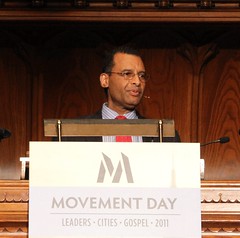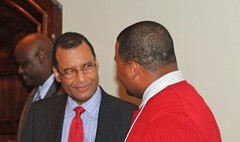by DeVona Alleyne | Oct 7, 2011 | Feature, Headline News |

FAITH ON TRIAL: Pastor Youcef Nadarkhani was arrested and sentenced to death in Iran because of his Christian beliefs.
For most Christians, answering whether they believe Jesus is the Son of God, died and rose again for their sins is an easy question with an obvious answer.
It’s easy, that is, for Christians across the United States. However, the same answer guaranteeing eternal life could elsewhere yield a death sentence.
While we can imagine that scenario in, say, first-century Rome, a modern-day pastor facing martyrdom in 2011 is almost unconscionable. But it’s really happening for Youcef Nadarkhani, a Christian pastor imprisoned right now in Iran. Pastor Nadarkhani was arrested two years ago for objecting to the teaching of Islam to Christian children at Iranian schools.
Nadarkhani was convicted of “apostasy” late last month and sentenced to death by the Islamic nation. But the story has taken several strange twists since, with Iranian officials now claiming Nadarkhani actually was convicted of crimes of rape and extortion. This curious 180-degree turn by Iran, in the wake of an international outcry against Nadarkhani’s conviction, has left many observers scratching their heads.
Whatever the latest spin from Iran, it’s clear that Nadarkhani’s commitment to his Christian faith lies at the heart of the case against him. According to the International Business Times, Nadarkhani was deemed an apostate because Iranian clerics determined that his ancestors were followers of Islam and that his professed belief in Christ constituted a rejection of that faith.
Given four chances to “repent and convert to Islam,” the Times reported that Nadarkhani refused. And for that, he was sentenced to die.
“Repent means to return. What should I return to?” he reportedly said in testimony during his four-day trial last month. “To the blasphemy that I had before my faith in Christ? I cannot.”
And I cannot imagine that level of boldness in the face of actual persecution. This is far beyond being called a “Jesus freak” or a “holy roller.” I’ve even evolved to a point of shakingoff discrimination I experience because I’m black or because I’m a woman. I don’t know what process I’d have to go through mentally to fearlessly stare down death just because I believe Jesus is who He said He is.
Yet we all worship among those who are often quick to call it persecution when they become the subject of the latest church gossip, when others disagree withthem, or even when their bosses require themto work on a Sunday. They’ll sing and shout that “no weapon formed against me shall prosper” from Isaiah 54:17, but the battle cry would assuredly have a lower volume if the weapon were death and prospering meant finally meeting Jesus face to face.
Nadarkhani’s case brings home Jesus’ words to his new disciples, formally introduced in Matthew 10, to expect to suffer in much the way He did. While we remember the ridicule, the scorn, and the disregard Jesus suffered and expect to experience it all as we live out a Christian lifestyle, we forget that as He died, we could die also. Western-dwelling Christians have been fortunate to avoid those more serious consequences, but it doesn’t mean it couldn’t or won’t happen.
And the threat for Nadarkhani remains very real, though his lawyer said last week that the sentence could still be overturned. It’s hard to believe, though, considering Iranian officials have more recently accused Nadarkhani of these additional charges. Others argue that even if he evades execution, Nadarkhani could remain in jail.
As much as I am disheartened when I consider Nadarkhani’s plight, I’m encouraged by his faith, which serves as a platform for witnessing to others — just as Jesus said such persecution would. “Physically, he looks weak,” his lawyer said of him last week, as reported by Reuters. “But emotionally his belief in Christ is keeping his spirits high.”
What if it were you in Nadarkhani’s place? Could you be as resolute in your faith?
When you’re Christian and actively trying to live it out past Sunday, you learn that it isn’t as easy to pull off as some make it seem. You risk losing friends because you might not support some of their lifestyle choices. You endure name-calling because you avoid using profanity. Maybe you don’t go out to lunch as often because you’re giving more money to your church. Those are small sacrifices compared to the possibility that Nadarkhani might have to die for just stating and standing by his Christians beliefs. The prospect alone should be a wake-up call for everyone with the freedom to openly proclaim Christ as Savior of the world.
Such a proclamation doesn’t have to come from a bullhorn. It should be evident in the way we live, the way we treat one another, and the way we support various ministries, including our own churches. Above all, though, it should come in how we share with others the ways that Christ’s life has made our lives more meaningful and abundant.
Rather than wavering, our boldness in professing Christ — loving out loud, living to honor Him, and increasing His kingdom — should increase knowing that, at least for the time being, we can do it without the threat of being executed.
by Christine A. Scheller | Oct 7, 2011 | Feature |

Dr. A.R. Bernard speaking at Movement Day in New York City.
Dr. A.R. Bernard is pastor and CEO of the 35,000-member Christian Cultural Center (CCC) in Brooklyn, New York, but spent ten years as a banker before he and his wife, Karen, founded the church 33 years ago.
Bernard was a keynote speaker at Movement Day, a New York City conference designed to accelerate gospel movements in America’s cities. While Dr. Tim Keller, pastor New York’s Redeemer Presbyterian Church, talked about the injustice of ignoring the needs of the poor, and Erwin McManus, pastor of Mosaic in Los Angeles, talked about the “spaces between us,” Bernard focused on how to build an institution and about “sanctifying” the customer service policies of American Express and Disney World.
An expert in organizational operations and best practices, Bernard told the audience, “Whereas others got into church planting and some started para-church organizations, we decided that we would establish an institution.”
People sometimes have negative perceptions of institutions, but “when creativity, innovation, and faith keep that organization alive and on the cutting edge, an institution becomes an entity that preserves not just history, but a record of progression,” he said.
Because Bernard believes managing both continuity and change are vital to longevity, he and his team at CCC came up with four “timeless fundamentals” that are implemented throughout the church’s departments:
1. clearly articulated, defined core values
2. clearly articulated, defined core purposes
3. remaining relevant and on the cutting edge of what CCC does
4. strength beyond the presence of any one individual.
“I’ve seen organizations that were built on a person,” Bernard explained. “That’s great because a charismatic leader does become the creative visionary force behind the establishment and building of an organization, but what happens is when it’s solely built on that person, when that person dies, the organization dies.”
“What one person begins, it takes a team of people to continue,” he added.

Dr. A.R. Bernard talking to an attendee at Movement Day.
This is where American Express and Disney World customer service training come in.
Bernard met with the American Express chief executive officer over marketing and customer service development in 1990 to glean principles that he could “sanctify” for ministry. The executive was so taken aback that a church was interested in customer service that she gave Bernard a copy of the company’s training manual, with the caveat that Bernard wouldn’t pass it to AmEx competitors.
“This was an awakening for many people. It really helped them to understand the difference between task and purpose because too many of them, without the proper training, become task oriented,” Bernard said.
For example, an usher whose task is to seat a person would defeat his or her purpose by treating parishioners rudely. “They’ve achieved their task, but failed in achieving their purpose, if the purpose is to make people feel warm and welcome,” he explained.
After a decade of using the AmEx model, Bernard looked to Disney for guidance, even taking 1,000 staff members to the entertainment giant’s training center in Florida for a staff retreat.
“Compliance and commitment are two different things,” he said. “People can comply just to be a part of the staff, just to be in the community. They’re not necessarily committed to the vision.”
That’s why CCC invests in both staff and volunteer development.
When UrbanFaith talked to Bernard during a break, he said he met with resistance when he first adopted customer service principles at CCC.
“There are those who are in a particular mind frame with regard to what the parameters of doing church and doing ministry is, and they were very critical,” he said. “Interestingly enough, here it is 20 years later and they’re now asking: how do we do it?”
“Ministry means serving,” he explained. “It means serving people and you need to be creative, you need to be wise, working within the principles of the faith, the orthodoxy of the faith, to achieve them. It requires structure. It requires organizational thinking and that’s my background.”
He looked to Moses as a biblical model for institutional leadership, he said.
“When I saw how God allowed Moses to grow and develop and learn and be educated in these things in Egypt, because he would then have to use it to lead and organize and structure over a million people that would become the nation of Israel, I appreciated that experience. I appreciated Moses in a different way.”
Bernard also talked about creating a home away from home for parishioners so that the emotional experience they have at church is a positive one.
“When people come to your church or whatever it is, your establishment that you are building for God, they leave with an emotional experience. If you don’t intentionally determine what that experience is going to be, then chances are great that it’s going to be negative and that will be the last time they come there. Environment is more than just a place that you gather to; it’s what you experience when you’re in that place,” he told the Movement Day audience.
So why not make the place they go to experience God their home away from home? Bernard asked. For Christian Cultural Center members, that home away from home grew from a storefront church into an 11.5 acre campus that is a catalyst for redemptive change in its community. And one man’s bold vision for “sanctifying” the skills he learned as a banker helped get it there.



